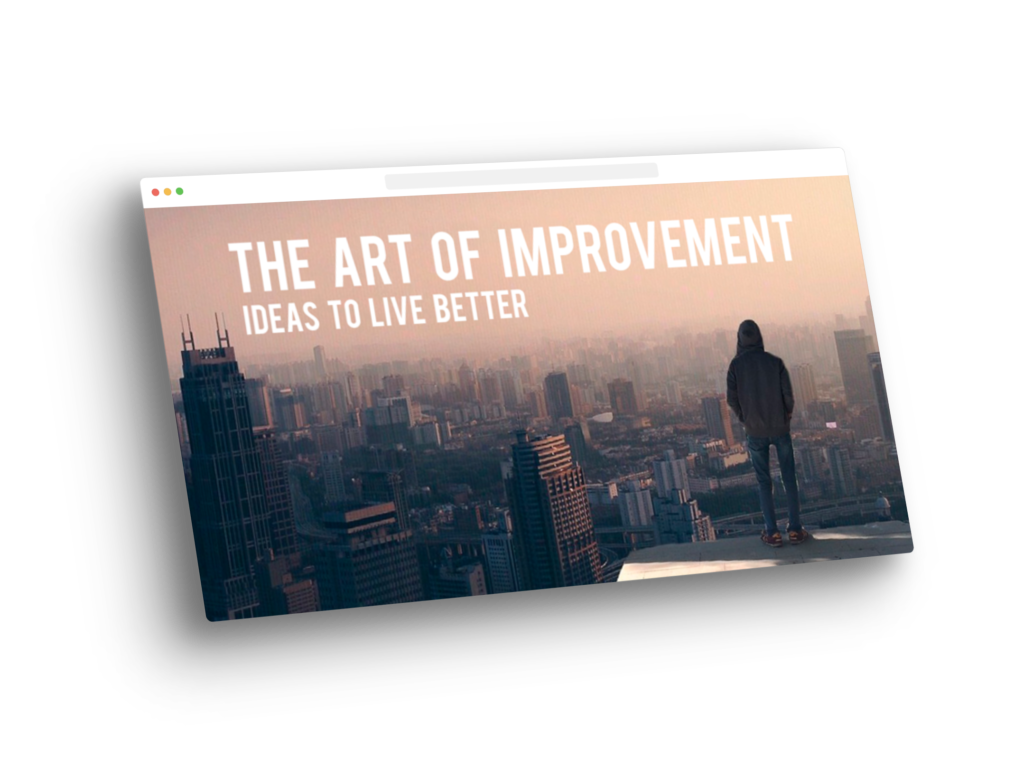When you think back on your school days, what’s the first thing that comes to mind? The school building itself? A memorable teacher? The friends you made? Chances are the actual lessons of reading, writing, math and science are not at the top of your list. Although they do serve as the basic skills of an education.
We may also learn certain social aspects that help us to be good citizens. At a very young age we learn to take turns, stand in a line, and function in a group. As we get older, we may learn more about cooperation and teamwork. And on a less positive side, we may experience relationship difficulties and peer pressure.
School days can help us develop both academically and socially. But do they prepare us for some of the real challenges we face once we head out into the big world on our own?
Albert Einstein said,
“Education is not the learning of facts but the training of the mind to think.”
We may have taken in a lot of information, and know how to access it. But is there something else we should’ve learned in school?
How to Think for Yourself
Learning how to think is more than just memorizing a list of facts and figures. Learning how to think for yourself involves forming opinions and making decisions based on your own understanding. Be curious and question everything. Re-examine your views and values often and be open to opposing viewpoints. By using critical thinking skills you can base your decisions on gathered facts, and know that things can change if new information is presented.
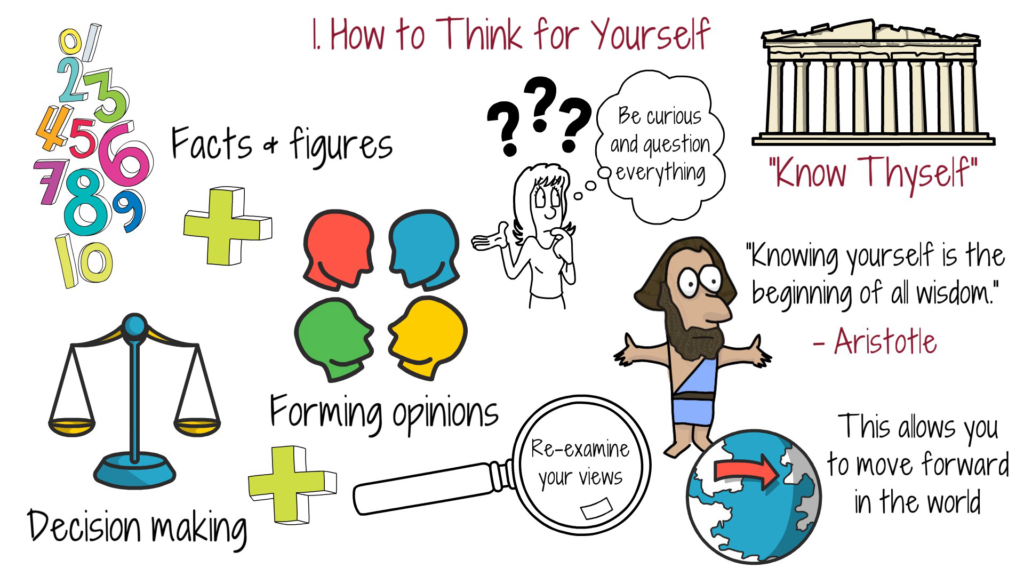
From the wisdom of Ancient Greece come the words, “Know Thyself.” By understanding your feelings and discovering your strengths and weaknesses, you develop self-awareness. That will help you make decisions and pursue goals in your best interest. Philosopher Aristotle said,
“Knowing yourself is the beginning of all wisdom.”
Which is the basic quality of having experience, knowledge and good judgment.
Combined with the lessons we learned from a formal education, thinking for yourself allows you to find your place in the world. Once equipped, you can move forward to discover your own destiny.
What the Right Mindset Can Do for You
Marcus Aurelius said,
“The Happiness of your life depends on the quality of your thoughts.”
By discovering how you think and why, you develop a unique mental attitude. Your mindset can determine your life outcome. For example, if you think that life is full of limitations, that is what you’ll find. And if you believe that life is full of opportunities, then those are the doors that will open up for you.
Some people have a mindset of scarcity or fear. They tend to focus on lack, as if there isn’t enough for everyone. This can manifest in the characteristics of greed or poverty. A person who believes there isn’t enough might try to grab as much as they can for themselves in order to feel safe. On the other side of the spectrum, some may feel as if they can never achieve success because there is a limited amount to go around. Life may seem more like a struggle than an adventure.
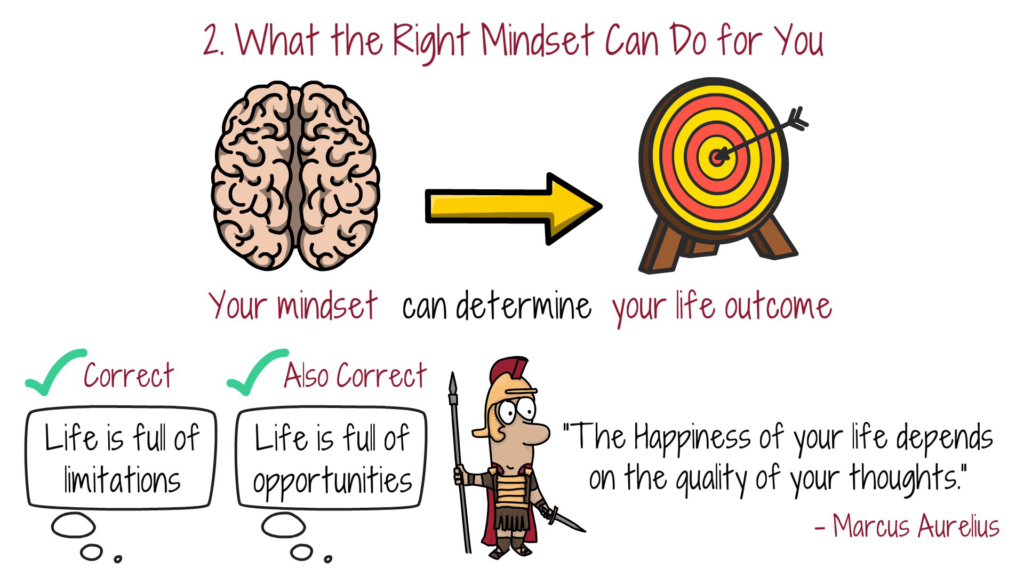
Other people who have a mindset of abundance see the world as being full of opportunities. They believe there is plenty for everyone and make efforts toward achieving their goals. They don’t need to hoard their treasures, but rather enjoy the fruits of their labor and expect that there is always more available! People with a mental attitude of abundance see opportunities everywhere they look. If you “see the glass as half full” instead of “half empty” you are looking at things on the side of abundance.
Your Failures Don’t Define You
When you’re in school, it can be easy to compare yourself to your classmates and sum up your status as a success or failure. In the real world, it doesn’t have to work that way. You will make mistakes, but you can use them to correct your course and move in another direction or try again.
Musician Jon Bon Jovi once said,
“Success is falling nine times and getting up ten.”
As you’re learning to navigate the world, you may have to figure out new ways of doing things.
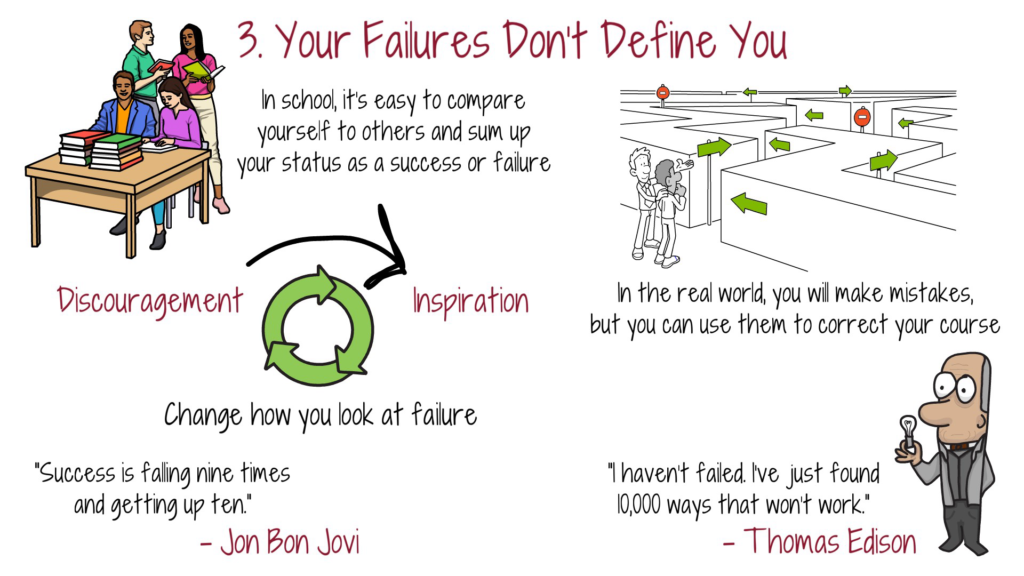
Inventor Thomas Edison looked at it this way,
“I haven’t failed. I’ve just found 10,000 ways that won’t work.”
By changing the perspective of how you look at failure, you may see it as a teacher and motivator. Instead of discouragement, you may find inspiration.
When you remember that everything is temporary, you can see your mistakes as minor setbacks and not a permanent part of who you are.
Resilience
Once you see that your failures are as important as your successes, you gain resilience. Knowing that obstacles and challenges will always be there, you can anticipate their existence and prepare as best you can. Author Mark Desvaux wrote,
“If we welcomed problems as a daily part of life, we’d spend less time being surprised by them and more time dealing with them.”
When you were in school, you may not have learned that problems are a necessary part of life. By accepting that things are going to come up and having a strategy to deal with them, you become more resilient with each passing event.

Keep yourself in top condition to deal with stressful situations. Eat healthy food. Get enough sleep. Stay active and have a good support system through friends, family or work relationships. Develop skills of self-control, problem solving and discernment. Then when the inevitable stages of adversity do arrive, you can move through them with confidence.
Author C.S. Lewis wrote,
“Hardships often prepare ordinary people for an extraordinary destiny.”
Uncertainty is Certain
At school, you probably felt a lot of uncertainty. Things were not always clear and could be subject to change. If you thought this was something that only happened during your school years, you may be surprised to find that life is full of uncertainty. Having ideas of what you want to do is a good rule of thumb when having goals and ambitions. But keep in mind that things often happen that change the trajectory of your best laid plans.
Author Nicole Reed stated,
“Sometimes the bad things that happen in our lives put us directly on the path to the best things that will ever happen to us.”
Even when our plans change or just don’t turn out the way we expected them to, it can turn out even better than we could have imagined.

We can’t always know how things will turn out. Weather changes. People don’t always do what we think they’re going to do. Plans fall through. Or sometimes we are surprised with good luck and blessings! Life is full of twists and turns. So the best plan of action is to know that nothing is certain. Make a plan! Then make a plan B! And sometimes plan C! Be flexible. Uncertainty may be inevitable, but it will always bring you opportunities to rethink your path.
The Gift of The Present
When you were in school you may have thought a lot about your future. People would ask you what you want to do with your life. Where will you go from here? What are your plans? But did anyone show you the value of the present moment?
If you are so focused on what will be in a year, five years, or even ten years from today, you miss the point of being here now. Keeping your mind on what you’re doing can help you become more aware of your surroundings and give your best to the current moment. In doing so, you get to experience more fully the life you are actually living.
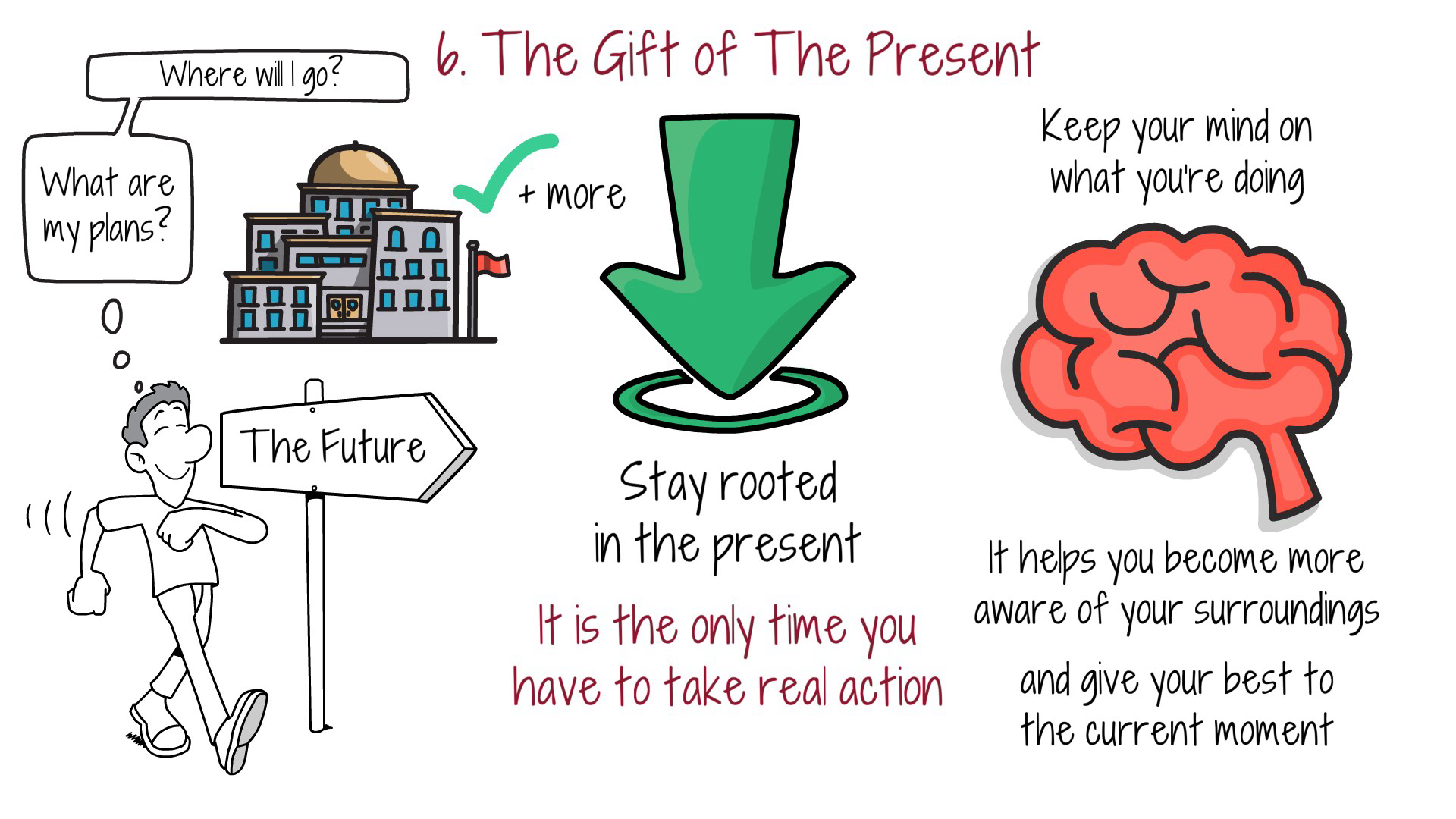
Learn from the past and plan for the future but stay rooted in the present. It is the only time you have to take real action.
The things we learn in school are valuable. But there is always so much more to know. And much that we should have learned but didn’t. Maybe that information wasn’t taught to us, or maybe we just weren’t paying attention. Either way, life has a way of teaching you anything you might have missed along the way.
Once you start thinking about it, learning never ends.
